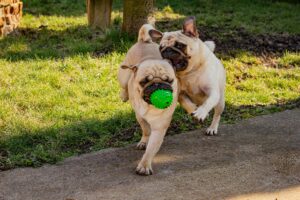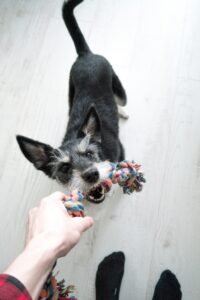Friends Who Play Together: The Importance of Social Play for Dogs
Some of a dog’s best life lessons happen in play — specifically, play with other dogs. Social play isn’t just fun, it’s how dogs learn proper communication, develop confidence, and practice cooperation. It can help prevent fear-based behaviors later in life and support emotional stability at every stage.
No toy can replace the joy and growth that comes from interacting with peers. Let’s dig into why playmates matter and how you can help your dog build great relationships.
Why Social Play Is Essential
Dogs are social animals. Even the friendliest humans can’t always communicate like another dog can.
Dog-to-dog play helps pups:
-
Learn healthy communication signals
-
Build confidence around unfamiliar dogs
-
Practice impulse control
-
Improve emotional regulation
-
Experience community and joy
It’s a natural stress reliever and mood booster — just like time with friends is for us.
What Healthy Play Looks Like
Good play has clear give-and-take. Look for:
✅ Loose bodies and wiggly movement
✅ Play bows to invite interaction
✅ Pauses or breaks to check in
✅ Taking turns in chase or wrestling
✅ Soft mouths and self-handicapping (strong dogs play gently)
Play should look chaotic — but feel safe.
 Red Flags During Play
Red Flags During Play
Not all interactions are perfect. Watch for:
🚫 Stiff posture
🚫 Pinning without breaks
🚫 Constant chasing with no role reversal
🚫 Hard staring or raised lip
🚫 A dog repeatedly trying to escape
If you see tension, politely separate and let everyone reset. Safety first.
The Role of Body Language
Dogs speak through posture, movement, and facial expression. Social play:
-
Sharpens reading of canine language
-
Helps dogs understand natural boundaries
-
Reduces future fear or aggression
A dog who has played with many different personalities becomes more adaptable long-term.
Where to Practice Social Play
Choose environments based on your dog’s comfort level:
🏡 One-on-one backyard meetups
🌳 Structured playgroups
🎓 Training classes with controlled exposure
🐕🦺 Supervised daycare for confident, social dogs
🐶 Small, off-peak dog park visits (only when appropriate)
Start with calm, friendly partners who match your dog’s size and play style.
Not Every Dog Wants Every Dog
Some dogs are selective about friends — and that’s okay!
Quality over quantity always wins.
Tips for matching playmates:
-
Similar size/energy level
-
Compatible play styles
-
Balanced personalities (not both “bossy”)
A calm role model can be especially helpful for shy dogs.
 Social Play Through the Lifespan
Social Play Through the Lifespan
🐶 Puppies: Learn etiquette, boundaries, bite inhibition
🐕 Adults: Maintain social skills & coping tools
👵 Seniors: Benefit from gentle companionship and mental stimulation
Modify play for aging joints or health needs — but keep the joy alive.
Human Involvement Matters
You set the tone!
A good play supervisor:
✔️ Monitors body language
✔️ Encourages breaks
✔️ Advocates for any dog who looks uncomfortable
Your support builds trust and security.
Final Thought
Social play shapes more confident, emotionally balanced dogs — and gives them happiness only another canine can provide. When play is safe and positive, dogs not only build skills… they build friendships.
Let them connect, communicate, and celebrate being a dog. 🐕💛🐕


